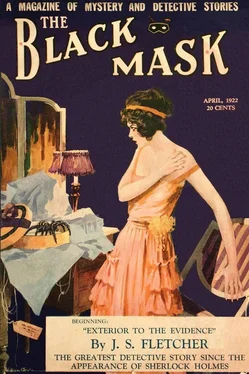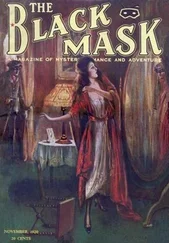J. Fletcher - The Black Mask Magazine (Vol. 5, No. 1 — April 1922)
Здесь есть возможность читать онлайн «J. Fletcher - The Black Mask Magazine (Vol. 5, No. 1 — April 1922)» весь текст электронной книги совершенно бесплатно (целиком полную версию без сокращений). В некоторых случаях можно слушать аудио, скачать через торрент в формате fb2 и присутствует краткое содержание. Город: New York, Год выпуска: 1922, Издательство: Pro-distributors Publishing Company, Жанр: Детектив, на английском языке. Описание произведения, (предисловие) а так же отзывы посетителей доступны на портале библиотеки ЛибКат.
- Название:The Black Mask Magazine (Vol. 5, No. 1 — April 1922)
- Автор:
- Издательство:Pro-distributors Publishing Company
- Жанр:
- Год:1922
- Город:New York
- ISBN:нет данных
- Рейтинг книги:3 / 5. Голосов: 1
-
Избранное:Добавить в избранное
- Отзывы:
-
Ваша оценка:
- 60
- 1
- 2
- 3
- 4
- 5
The Black Mask Magazine (Vol. 5, No. 1 — April 1922): краткое содержание, описание и аннотация
Предлагаем к чтению аннотацию, описание, краткое содержание или предисловие (зависит от того, что написал сам автор книги «The Black Mask Magazine (Vol. 5, No. 1 — April 1922)»). Если вы не нашли необходимую информацию о книге — напишите в комментариях, мы постараемся отыскать её.
The Black Mask Magazine (Vol. 5, No. 1 — April 1922) — читать онлайн бесплатно полную книгу (весь текст) целиком
Ниже представлен текст книги, разбитый по страницам. Система сохранения места последней прочитанной страницы, позволяет с удобством читать онлайн бесплатно книгу «The Black Mask Magazine (Vol. 5, No. 1 — April 1922)», без необходимости каждый раз заново искать на чём Вы остановились. Поставьте закладку, и сможете в любой момент перейти на страницу, на которой закончили чтение.
Интервал:
Закладка:
She leaned closer and spoke in a crooning voice, “You’re — through, Rudie. But don’t be — afraid, boy, don’t be afraid.”
“Me? — afraid — I could die many times like this—”
Captain Wayne, standing nearby, took off his hat — and then turned away. “I can’t help it,” he said. “When I see a guy pass out with his head up — crook or no crook — it — it gets me, somehow.”
XVII
The Mogul’s tribe, having lost its leaders, disbanded and scattered to the four corners of the earth! Frank Yost squealed and pleaded for mercy; that’s how they solved the mystery of “James” at headquarters. “James” was “John Ames,” a detective whose record showed several suspensions for drunkenness and disorderly conduct. The gang had run his initial and last name together and called him “James” so as to cover his identity...
Sergeant Alan Nevins tore up the envelope which contained the history of Rita Daly’s murder of J. Stanley Bradshaw.
Sergeant Alan Nevins arrested Miss Marguerite Cornell and brought her before the district attorney on the charge of having been implicated in the blackmailing of one Mr. Rinault. The district attorney looked at Miss Cornell over his nose glasses, said, “Hum, hum,” and promised to look into the matter.
The district attorney investigated one Mr. Rinault.
A week later, Sergeant Alan Nevins again towed Miss Cornell before the district attorney. The district attorney invited them to have dinner with him at his home that evening and then he threw the two of them out of his office.
April. The anniversary of the death of Police Captain James Cornell. A slender girl with wistful eyes and a handsome young man are standing at Captain Cornell’s grave. The girl is holding a small note-book which is turned open to a page bearing the following inscription:
J. STANLEY BRADSHAW — assassinated.
HARRY CREIGHTON — killed during raid.
BENNY KAMP — killed during raid.
TONY IGLANO — convicted of murder, electrocuted.
JUDITH CREIGHTON — suicide.
GEORGE GEIGER — convicted receiving stolen goods, 5 years.
ARTHUR ASHLEY — convicted receiving stolen goods , 5 years.
HENRY WORTZ — convicted counterfeiting, 10 years.
LARRY HARKER — convicted of attempted assault, 5 years.
FRANK YOST — convicted of attempted assault, 4 years.
FOUR OTHER ARRESTS AND CONVICTIONS ON CHARGES OF COUNTERFEITING AND ASSAULT.
And now, Jimmy, sleep in peace!
There was no mention of Rudie Breen, who had atoned by giving his life to protect a woman.
“If Jimmy could see this book, what you do think he’d say?” asked Marguerite Cornell.
“Jimmy would be proud of the fine courage of his little sister,” answered Alan Nevins. “But he would be profoundly grieved because so much suffering was necessary to atone for his death.”
“Hold a match to this note-book, Alan.”
So they watched the book burn to ashes.
Then — we have said it was April — it rained. The two were holding hands, but in his free hand, Nevins had an umbrella. It never occurred to him to open it, nor did Marguerite ask him to. Perhaps the two had noticed the sun smiling behind the cloud. Or perhaps they considered the shower a blessing upon them from above...
(The End)
The Brand of Cain
by Ward Sterling
I
Doctor Andrews, the physician who had been called in by the coroner, gave as his opinion that Waldo Fellows had met death shortly after midnight. The condition of the body, he said, proved his contention. Then, too, the fact that the blood with which the sheets were smeared had dried and hardened caused him to stick to his statement.
Yet Orville Hitchens, Fellows’ secretary, swore that his employer had been alive and well at two o’clock in the morning.
Hitchens stated that he had been summoned by Fellows at one o’clock and requested to drive to Amboy, two miles away, for some bromide. Mr. Fellows had been extremely nervous of late and found himself unable to sleep. Finding that he had no bromide — a drug that he was accustomed to taking — he had awakened the secretary. Hitchens asserted that he had taken the light car, made the trip and returned just before the clock struck two. Fellows had taken a dose of the drug and Hitchens had again retired.
Henry Phelps, the drug clerk, verified Hitchens’ statement as to the purchase of the bromide, while Landes, the chauffeur, told of getting out the light car for the secretary, who had driven it himself.
In spite of this Doctor Andrews stuck to his statement that the murdered man had been dead at least ten hours when he made his examination. Swenson, the valet, had discovered the murder when he went to awaken his master at eight o’clock.
It was nearly ten o’clock when Coroner Stevenson arrived, accompanied by Doctor Andrews and Bram Dwyer, the New York detective, who, with myself, was spending a few days’ vacation in the little village. The prominence of the murdered man, coupled with the fact that the detective and Stevenson were old friends, caused the New Yorker to interest himself in the case at the latter’s request.
Fellows was a gentleman farmer — a man worth several millions of dollars made in Wall Street, who, tired of life in the city, had purchased Samoset Farm just at the edge of Amboy township and, after stocking it with the finest blooded cattle and horses that money could buy, had settled down to a life of rustic bliss. As time passed he had added to his acreage by purchasing adjoining farms until half the township was his.
He had erected a mansion around which he had built smaller homes for his employes. These with the great barns, sheds for the machinery, dairy and offices made Samoset Farm almost a small town.
Such a man as Waldo Fellows set down in the midst of a rural community is bound to be sought out by his fellow-men. Twice he had reluctantly allowed himself to represent his district in the State Legislature. The Governor’s chair could have been his for the asking. His fellow-townsmen loved him for the nobility of his character. Yet he had enemies by the score — many of them the small landowners whose farms surrounded his. For the man who does things on a big scale is certain sooner or later to tramp on the toes of others.
But who among those he had offended hated him to the extent of taking his life?
II
Fellows was murdered in bed, apparently in cold blood, for there was no evidence of a struggle of any kind. Nothing in the room had been disturbed. So far as could be ascertained nothing of value had been taken. The fact that the bedding was not mussed led to the belief that the murderer had struck while his victim was asleep.
None of the servants nor Mrs. Fellows — who slept just across the hall — had heard any noise save when Hitchens returned from the drug store with the drug which Fellows had requested. Mrs. Fellows had called over the transom to Hitchens to ask what was the matter and he had told her of his employer’s sleeplessness.
The bottle of bromide with a small quantity gone was found on the table beside the bed. Bromide seldom acts inside of half to three-quarters of an hour. Hence, assuming that Hitchens had told the truth — and everything pointed to his having done so — Fellows must, if he was killed in his sleep, have met death not earlier than three o’clock.
Yet the blood which had flowed from the wound, the condition of the body — everything — led a cool, conservative medical man to declare that death had struck at least three hours earlier. Nor could his testimony be shaken.
Читать дальшеИнтервал:
Закладка:
Похожие книги на «The Black Mask Magazine (Vol. 5, No. 1 — April 1922)»
Представляем Вашему вниманию похожие книги на «The Black Mask Magazine (Vol. 5, No. 1 — April 1922)» списком для выбора. Мы отобрали схожую по названию и смыслу литературу в надежде предоставить читателям больше вариантов отыскать новые, интересные, ещё непрочитанные произведения.
Обсуждение, отзывы о книге «The Black Mask Magazine (Vol. 5, No. 1 — April 1922)» и просто собственные мнения читателей. Оставьте ваши комментарии, напишите, что Вы думаете о произведении, его смысле или главных героях. Укажите что конкретно понравилось, а что нет, и почему Вы так считаете.












